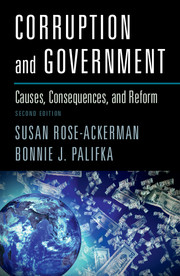Book contents
- Frontmatter
- Dedication
- Contents
- List of Figures
- List of Tables
- List of Boxes
- List of Acronyms
- Preface to the First Edition (1999)
- Preface to the Second Edition
- Acknowledgments
- INTRODUCTION
- PART I CORRUPTION AS AN ECONOMIC PROBLEM
- 2 Bureaucratic Corruption
- 3 Corruption in Procurement and Privatization
- 4 Reducing Incentives and Increasing Costs
- 5 Civil Service Reform and Bureaucratic Reorganization
- 6 Using the Criminal Law to Deter Bribery and Extortion
- PART II CORRUPTION AS A CULTURAL PROBLEM
- PART III CORRUPTION AS A POLITICAL PROBLEM
- PART IV REFORM AGENDAS: DOMESTIC POLITICAL WILL AND INTERNATIONAL INFLUENCE
- CONCLUSIONS
- References
- Index
3 - Corruption in Procurement and Privatization
from PART I - CORRUPTION AS AN ECONOMIC PROBLEM
Published online by Cambridge University Press: 05 March 2016
- Frontmatter
- Dedication
- Contents
- List of Figures
- List of Tables
- List of Boxes
- List of Acronyms
- Preface to the First Edition (1999)
- Preface to the Second Edition
- Acknowledgments
- INTRODUCTION
- PART I CORRUPTION AS AN ECONOMIC PROBLEM
- 2 Bureaucratic Corruption
- 3 Corruption in Procurement and Privatization
- 4 Reducing Incentives and Increasing Costs
- 5 Civil Service Reform and Bureaucratic Reorganization
- 6 Using the Criminal Law to Deter Bribery and Extortion
- PART II CORRUPTION AS A CULTURAL PROBLEM
- PART III CORRUPTION AS A POLITICAL PROBLEM
- PART IV REFORM AGENDAS: DOMESTIC POLITICAL WILL AND INTERNATIONAL INFLUENCE
- CONCLUSIONS
- References
- Index
Summary
Government contracts, concessions, and the privatization of public assets are often more lucrative than similar private-sector deals. Corruption can allocate these scarce and valuable benefits. Kickbacks at the highest levels of government may corrupt the bidding process in public tenders and privatization processes and hence can affect the cost and quality of major one-of-a-kind infrastructure projects and the benefits that flow from concession contracts and the sale of key state assets. Such “grand corruption” transfers monopoly rents to private investors, in exchange for payoffs to elite, corrupted officials who receive a share of the profits in the form of kickbacks (Moody-Stuart 1997). It can have a major impact on government budgets, on a country's growth prospects, and on the distribution of the gains from government programs and investments. This type of corruption is apparently quite common. In a 2012 survey of three thousand business executives in 30 countries, 27% believed that they had lost a government contract in the previous year because their “competition” had paid a bribe to obtain the contract; the responses ranged from 2% in Japan to 50% in Malaysia. Other evidence of serious problems comes from particular countries. In Brazil, for example, 87% of firms indicated that bribes and nepotism are frequent in government procurement, more than in any other area studied (Weber Abramo 2004), and in a second survey of firms 62% of respondents that had bid for public works had faced requests for bribes (Kroll and Transparencia Brasil 2003: 8).
The deals that interest us the most involve large, multinational corporations operating alone or jointly with local partners. This is an important class of cases. There is no definitive measure of the extent and impact of such corruption, but its importance is suggested both by ongoing exposés around the world and by the salience of the OECD Anti-Corruption Convention (see Chapter 14), which requires signatories to sanction overseas bribery. The OECD collects data on transnational firms that were sanctioned in their home countries for paying bribes abroad to get or retain business. According to their data, 57% of the foreign bribery cases resolved between 1999 and 2013 under the OECD Anti-Corruption Convention involved public procurement (OECD 2014: 32, figure 20). Overall, at least 60% of the cases involved firms with at least 250 employees (OECD 2014: 21).
- Type
- Chapter
- Information
- Corruption and GovernmentCauses, Consequences, and Reform, pp. 93 - 125Publisher: Cambridge University PressPrint publication year: 2016



